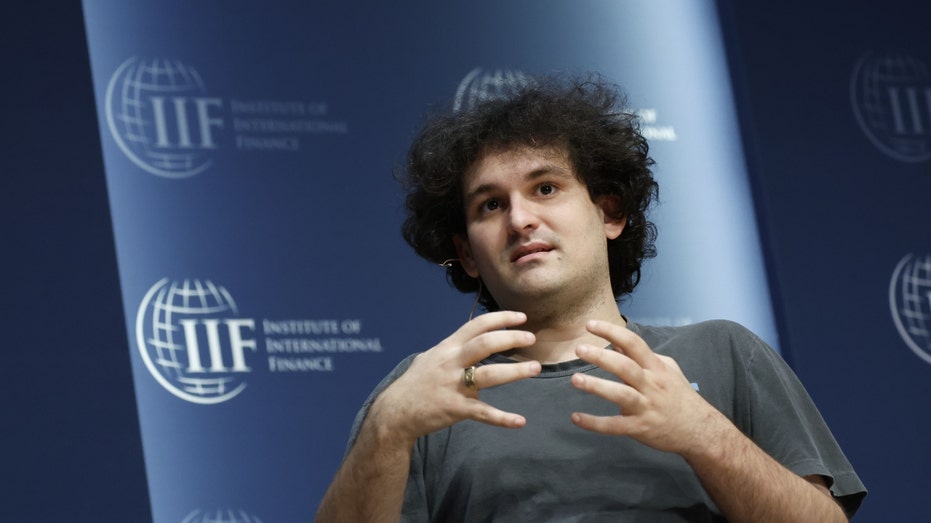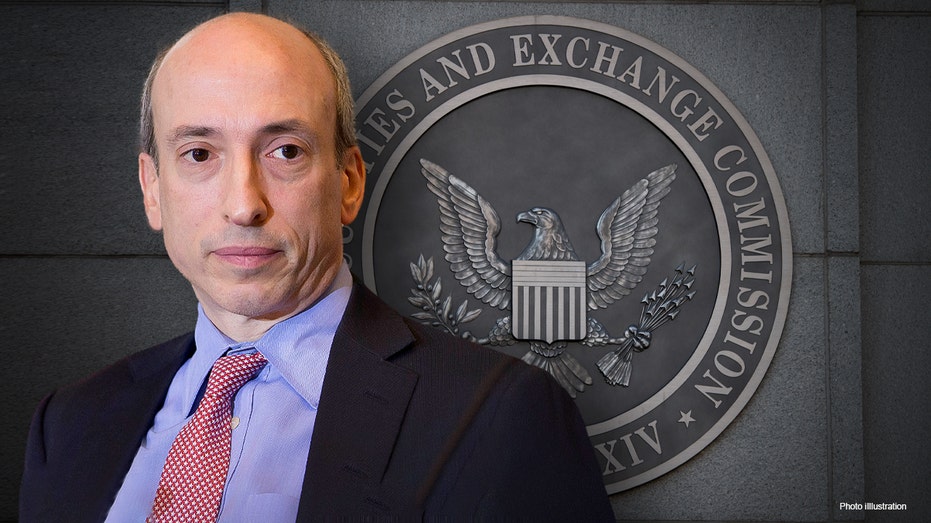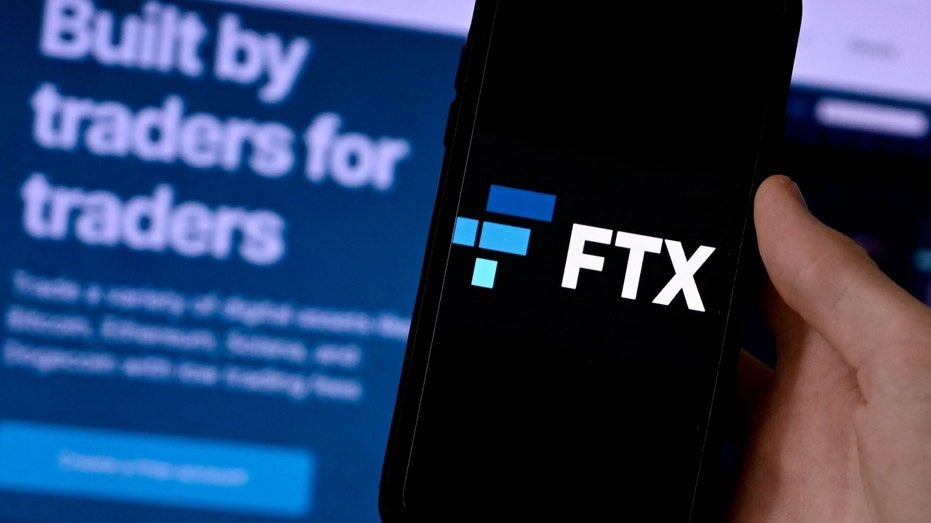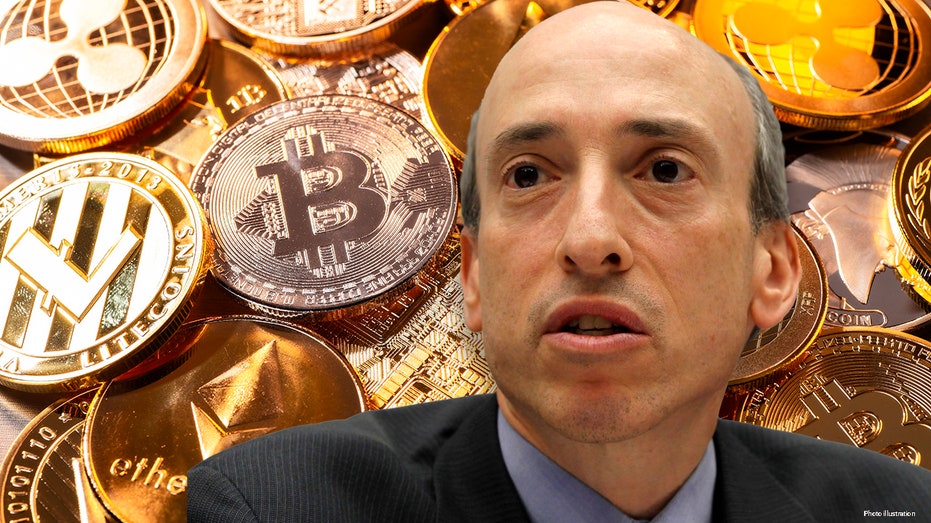SEC Chairman Gary Gensler met with head of FTX months before collapse
Despite the scrutiny of crypto by Gensler, the SEC missed on FTX
Did FTX meltdown turn the 'crypto winter' into a 'crypto ice age'?
D.A. Davidson director of research Gil Lauria and Duke Financial Economics Center policy director Lee Reiners debate the case for cryptocurrency as the FTX crisis continues to unfold on 'The Claman Countdown.'
Gary Gensler’s controversial tenure as chairman of the Securities and Exchange Commission could reach peak drama over a 45-minute Zoom call with Sam Bankman-Fried, the former crypto wunderkind at the center of the largest debacle the $1 trillion digital coin industry has ever witnessed.
On March 23, some eight months before Bankman-Fried’s crypto empire collapsed and was forced into bankruptcy, Gensler granted what some crypto players are calling an unusual meeting to the then-billionaire and prolific fundraiser for Democratic candidates, including his boss, President Biden.
Even before the FTX imbroglio, Gensler mounted an aggressive and, some would say, controversial regulatory assault on the crypto business. In public comments, he has stated most digital coins qualify as unregistered securities, and thus creators could face sanctions similar to those sought from executives of Ripple who face an SEC lawsuit over the unregistered issuance of their native coin XRP.
While exchanges such as Coinbase, Binance, and Bankman-Fried’s FTX process crypto trades for customers, they operate in a regulatory gray area without explicit SEC approval, thus opening management to possible sanctions.

Sam Bankman-Fried, founder and chief executive officer of FTX Cryptocurrency Derivatives Exchange, speaks during the Institute of International Finance (IIF) annual membership meeting in Washington, DC, US, on Thursday, Oct. 13, 2022. This year's con (Photographer: Ting Shen/Bloomberg via Getty Images / Getty Images)
Now some crypto players and Gensler’s critics in Congress are questioning why he missed the FTX debacle and recent bankruptcy amid his sweeping crackdown. At issue: A meeting between Bankman-Fried and Gensler where they discussed an idea for a new SEC-approved crypto trading platform. If approved, the former FTX chief would have received a jump-start on the competition with a trading platform explicitly meeting the SEC standards, people with direct knowledge of the matter told Fox Business.
Bankman-Fried was eyeing a venture with stock exchange IEX, founded by Brad Katsuyama. The veteran trader was featured as the protagonist in journalist Michael Lewis’s book Flash Boys, which chronicled the antics of high-frequency trading on Wall Street.
Katsuyama and his team, along with Bankman-Fried with his top people, provided Gensler and senior SEC officials with the broad outlines of their idea and questioned whether existing SEC rules — formulated through so-called no-action letters that set industry standards — would apply to their new venture, according to people with direct knowledge of the matter.
Gensler was said to be lukewarm to their pitch, these people add, not explicitly ruling it out but also not indicating he would give it his green-light. He wanted any new SEC-announced crypto exchange to mirror standards of public exchanges like Nasdaq and the New York Stock Exchange, they added.
It's unclear how much Genlser dove into Blankman-Fried's ill-fated FTX business operations. Bankman-Fried has resigned from the famously imploded crypto platform, exposing both a complex matrix of investments in various businesses and an unusual relationship with something called Alameda Research, a hedge fund-like investment vehicle Bankman-Fried ran from offices in Hong Kong.

The U.S. Securities and Exchange Commission (SEC) said on Friday that it would delay enforcement of certain assets from a new disclosure rule for off-exchange securities until Jan. 3, 2022. Photographer: Andrew Harrer/Bloomberg via Getty Images (Photographer: Andrew Harrer/Bloomberg / Getty Images)
Officials from FTX and IEX together held one more meeting with the SEC on the concept as it began to take shape in the months to follow. Executives from IEX met with SEC officials separately nearly up until the time of the FTX bankruptcy last week, these people say.
Katsayuma is said to be still interested in moving forward even without FTX as a partner, possibly buying FTX's technology as a custodian in bankruptcy, a person with knowledge of the matter says. FTX is also a minority investor in IEX, and IEX officials are trying to buy back shares held by the company.
In a statement to Fox Business, IEX said it "maintains regular contact with the SEC on a variety of topics. We engaged with them to better understand their view of the regulatory paradigm that should apply to the digital asset securities space. At no time have we sought, nor did the SEC ever suggest, that any entity could or should be given special treatment." It added: "FTX US’s recent Chapter 11 filing has no impact on IEX Group’s business. FTX US made a minority investment in IEX Group and there is no relationship or governance with any IEX operating businesses. Our revenue and cash flows remain at record levels, and our focus and commitment across all our business lines remain unchanged."
A legal representative for FTX didn’t return an email for comment. Bankman-Fried could not be reached for comment.
Bankman-Fried, 30, was once worth north of $20 billion, but his fortune has largely evaporated amid the FTX collapse as he faces mounting legal woes. The ties between FTX and Alameda are the focus of numerous criminal and regulatory investigations following FTX's bankruptcy and reports that Bankman-Fried may have used FTX customer accounts to privately fund risky investments made by Alameda.
The FTX implosion resembled a classic bank run; as word spread about the possible links between the two businesses (customer accounts are supposed to be segmented from other businesses), investors withdrew money from FTX. They unloaded its native coin, the FTT token, which was also held in significant quantities by Alameda and is now virtually worthless.
The news also scuttled a potential white-knight savior, rival crypto exchange Binance, from buying FTX to avoid bankruptcy and the possible loss of billions of dollars of customer funds.

Cryptocurrency mixing platform, Tornado Cash, has been hit with US sanctions over allegations of money laundering. Cryptocurrency Illistration picture taken on Jan. 24, 2022. (REUTERS/Dado Ruvic/Illustration / Reuters)
Gensler was appointed SEC chair two years ago and has ruffled feathers by pushing the SEC's authority into nontraditional areas such as corporate climate change disclosure. The FTX debacle also coincides with Gensler's aggressive crackdown on alleged crypto abuse despite questions as to whether the SEC has the authority to regulate digital coins.
But he now finds himself in a peculiar position having to defend himself from attacks by industry executives and Republicans in Congress for missing maybe the biggest debacle in industry history while having a private meeting with the person at the center of it all, the politically connected crypto-bro, Sam Bankman-Fried, known for wearing shorts, donning hoodies and his unkempt hair.
He was frequently referred to by his initials "SBF," a fitting moniker for one of crypto's richest and most recognizable figures until his recent fall from grace. And his power had extended beyond crypto. He’s also the second-largest contributor to Democrats in the midterms behind George Soros, donating around $36 million on top of the $10 million he gave to Biden's 2020 presidential campaign. With money came influence: He was feted by regulators and lawmakers for ideas on crypto oversight. He was featured on magazine covers as the next Warren Buffett and considered one of the top industry thought leaders.
But all that is now gone, and his past influence in the crypto industry is drawing scrutiny from law enforcement and leaders of the likely GOP-controlled House. Congressman Tom Emmer, a Republican from Minnesota and a member of the House Financial Service Committee, recently tweeted that his meetings with Gensler – first disclosed in the SEC chair’s public calendar-- indicated that the SEC was prepared to give FTX and Bankman-Fried a "regulatory monopoly" for a new crypto exchange.
"Reports to my office alleged he (Gensler) was helping SBF and FTX work on legal loopholes to obtain a regulatory monopoly. We're looking into this," Emmer wrote. Fox Business has learned that if the GOP wins control of the House, they plan hearings into the Gensler-FTX deliberations.

This illustration photo shows a smart phone screen displaying the logo of FTX, the crypto exchange platform, with a screen showing the FTX website in the background in Arlington, Virginia on February 10, 2022. - Sam Bankman-Fried donned a suit and ti ((Photo by OLIVIER DOULIERY / AFP) (Photo by OLIVIER DOULIERY/AFP via Getty Images) / Getty Images)
To be sure, it is common for securities industry executives to meet with top SEC officials and staff about various matters, including new business ventures that may spark SEC scrutiny. A spokesman for the SEC declined to comment other than to refer Fox Business to a CNBC interview in which Gensler said there was nothing inappropriate with his meetings with Bankman-Fried because he typically meets with industry professionals.
"I think we've been clear in the meetings," Gensler said in the interview, "...no-compliance is not going to work, the public is going to be hurt..." A representative for FTX and Bankman-Fried didn’t return calls for comment.
People with first-hand knowledge of the SEC's deliberations with FTX, including the March meeting with Gensler, say it would be nearly impossible for the SEC chair to grant a regulatory monopoly to one entity; competitors could simply copy the model for their own exchange.
One person with knowledge of the March meeting with Gensler described it as a "45-minute lecture" by Gensler on what he believed crypto exchanges needed to do to comply with current law. Gensler also said that the Alameda fund must be a completely separate entity from any crypto trading venue they were planning.
The person said Bankman-Fried and Katsuyama did not yet have a concrete plan on the crypto-trading platform even if they did come with a slide-deck to outline their proposal during their meeting with Gensler.

Frankfurt, Hesse, Germany - April 17, 2018: Many coins of various cryptocurrencies (iStock/Reuters)
Their main objective was to "get a feel for what the SEC was looking for." The two sides would meet several more times, with IEX taking the leading in the coming months in discussions with the SEC, these people say.
It's unclear if the SEC was prepared to greenlight the project any time soon. Any new exchange would also need approval from the full commission, which is a timely process.
Still, some industry critics of Gensler say the very existence of the meetings shows that the SEC was given preferential treatment to a controversial crypto executive because of his Democratic Party ties. Industry executives usually meet with the commission on new business projects after the SEC has formalized rules—and it’s unclear if the SEC will propose new rules specifically on crypto exchanges.
"If the GOP takes Congress, Gensler will have to answer these questions at hearings," said one crypto industry insider with close ties to the GOP.





















